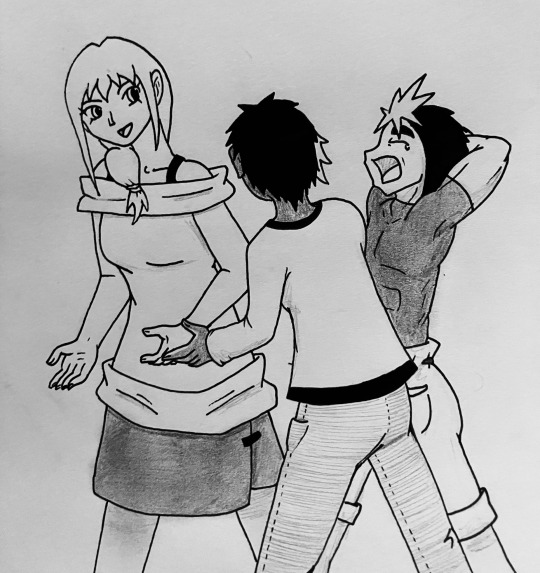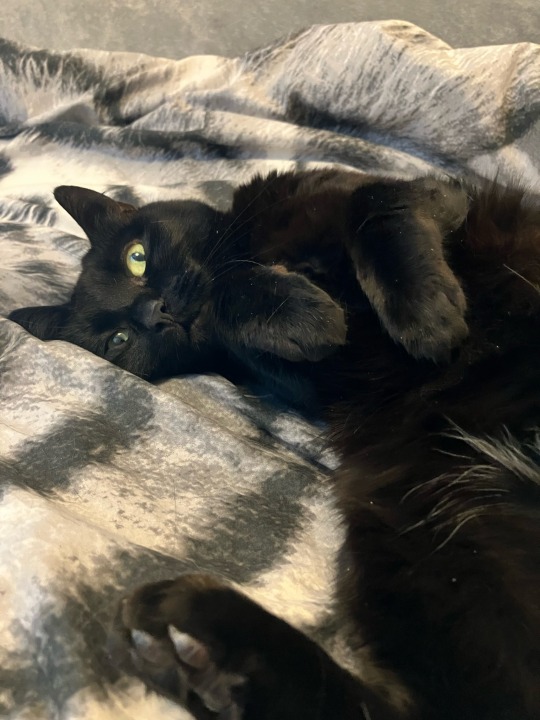Text
Chapter 24 + 25
Amal’s life in the states is so different from Palestine she’s like a different person. However despite how she tries to blend in her roots are still a part of her and what scares her white peers leaves her unfazed.
She stays several years in the US until she finally gets a phone call from her brother, the first contact since he left. Apparently he’s gotten married to his girlfriend and they have a baby on the way. They invite Amal to come back home and visit them which she happily wants to. So now she’s about to return to her home but I’m not sure it’ll be the same as before.
0 notes
Text
Chapter 23
Despite the subpar conditions of the orphanage (cockroaches in the food, yuck) Amal manages to have a nice time there thanks to the friends she made. At the end of her time there she also gets an offer to come studying in the US and just like with the orphanage decision she’s about to turn it down until someone talks some sense into her. In the end she decides to leave the world/land she knows in the hope of a better future.
0 notes
Text
Chapter 22
Amal says her goodbyes to her family and friends and travels to the orphanage/school. It's difficult for her to enter a new environment without any people she knows but the other girls there seem nice so it doesn't look like it'll be too hard for her there.
0 notes
Text

I got to paint with watercolor for a bit so I tried to draw an Umberon from memory (why it has blue eyes). Sadly I didn't get a picture of it when it was finished.
2 notes
·
View notes
Text

It's really been a while since I drew them.
3 notes
·
View notes
Text
Chapter 21
Amal's mother dies which means she's lost all her closest family members (her brother is still away fighting and probably doesn't even know that his mum has died). While she does have other relatives who love and want to care for her none of them has the ability/resources to provide for her. She's a bit afraid they'll try to marry her off to someone but no, they instead come with the offer to send her away to a "school for orphans", it sounds a bit like a boarder school except made for the poorest of the poor.
At first Amal isn't interested in this, she doesn't want to leave her home, but they eventually manage to convince her to go. It is, after all, what her father would have wanted for her.
0 notes
Text
Chapter 19 + 20
It’s already clear that Amal’s life is horrible because of the occupation but somehow life like to twist the knife a bit more. First, right as she thought she managed to reconnect to her brother he tells her he’s leaving causing her to run away and sleep the night outdoors. Then, the next morning she’s searched by some soldiers and then shot at, one of the bullets hitting her non-leatal. And when she gets home Yousef is already gone. Then, to top it all off she’s gotten her first period.
Another point is that the rebel forces Yousef seems to have joined failed to accomplish anything worthwhile.
3 notes
·
View notes
Text
I kind of wish that, in the scene where Light is trying to figure out Naomi Misora's real name, he would have tried to attack/wrestle with her ONLY because I think it would be funny to see her kick him in his smug face.
(I know it was made canon retroactively but she knows capoeira and is good enough with it to fight off a random attacker. She's also the reason for why L knows it. It's stated in the "Another note" novel.)
#death note#manga#anime#meta?#my thoughts#text#funny?#light yagami#naomi misora#capoeira#just imagine Light lying flat on the ground with Ryuk laughing in the background#then Naomi goes and informs L who Kira is#a happy ending for everyone
47 notes
·
View notes
Text
Chapter 18
This chapter switches between Amal's and Yousef's perspectives.
Turns out Yousef deals with trauma the same way his mum does by shutting out the rest of the world. He supports his family with money but both mentally and physically he avoids them. In contrast Amal is desperate to regain some kind of normalcy and practically begs her brother for some kind of love/comfort. Her efforts do however pay off in that she manages to get all three members of the family (her, Yousef and their mum) to sit down and have dinner together "like old times". It's a nice dinner and Yousef actually interacts with Amal and they have a short moment of happiness. Sadly this is apparently the last time the three of them will be together (strong hints that the mother will die).
Then it appears Yousef's finally decided on what to do. He sends Amal and Huda to deliver a letter to his love but when said love reads it she begins to cry sad tears. My guess is that the letter explain what happened to him and that he is planning to confront Ismael/David.
1 note
·
View note
Text
Chapter 15, 16, and 17
Because how short these chapters are (17 is less than a page) I’m just going to bunch them together. (Might do it with the rest of the book too.)
It is still focusing on the conflict with Yousef and David. David horribly beats up Yousef because he doesn’t want to think about why they pretty much look identical. On the other hand Yousef only manages to get through it all by thinking of the girl he likes. However sadly the damage he recieved causes him to be scared of meeting her after he’s returned. And this is despite the fact she seems to really like him. (He might have gotten impotent.)
During all of this Yousef sees that his sister needs/expect him to take on the role of their still missing (possibly dead) dad.
It’s just horrible all around.
1 note
·
View note
Text
Chapter 14
Yousef has a short lament about the horrors he’s seen. He also drives home how truly awful it is to kill a random person ”as an example”.
1 note
·
View note
Text
Chapter 13
Ok. So it wasn’t just Yousef who recognised Ismael/David but David also noticed that they looked almost identical. It seems it’s only a matter of time until the truth gets out.
Now the question is: what will he do when he learns that truth?
1 note
·
View note
Text
Chapter 12
Another perspective shift. Now Amal’s older brother is the narrator. He is studying in Bethlehem and stays at his dad’s jewish friend’s place when he hears news about the war breaking out.
I think this part might show what happened to him during the 40 days he was held captive?
1 note
·
View note
Text
Chapter 11
We are shown a bit of Ismael/David’s life. He grew up being loved and cared for by his kidnappers and considers them his parents. He isn’t aware he’s adopted which will probably lead to a conflict down the line.
1 note
·
View note
Text
Chapter 10
I misunderstood the ending of the last chapter. Amal is still living with her mum, though all the loss has put Dalia in a deep depression she never recovered from.
All the men had been taken in the attack which caused even more grief than just having bombs dropped on them. Then 40 days later some of the men (the youngest and oldest) managed to make it back to the camp. Amal is reunited with her brother but her dad is presumed dead.
It is also revieled that he saw the ”lost brother” as one of the Israeli soldiers. Since he has that scar on his face.
1 note
·
View note
Text
Chapter 9
The war/battle between Israel and Egypt 1967 breaks out and the refugee camp is caught in the fire. Amal and her best friend Huda take cover in a hidden basement (essentially a small hole in the ground). They only catch a small glimpse of the actual "fighting" (more a massacre) but what they do see is horrifying and traumatizing. (It seems like Huda's entire family died.)
When it's pretty much over and they wander around the wreckage and is picked up by some UN personnel. They're taken to safety and Amal is briefly reunited with her mother. However due to her mother being unresponsive (she seems to be either catatonic or disassociating) Amal gets angry as children tend to do and when the UN people ask if there's anyone at the camp she knows she says "no". So we'll see where she ends up now when she's gotten the stamp of war orphan. (It is unknown what happened to her dad and brother.)
1 note
·
View note
